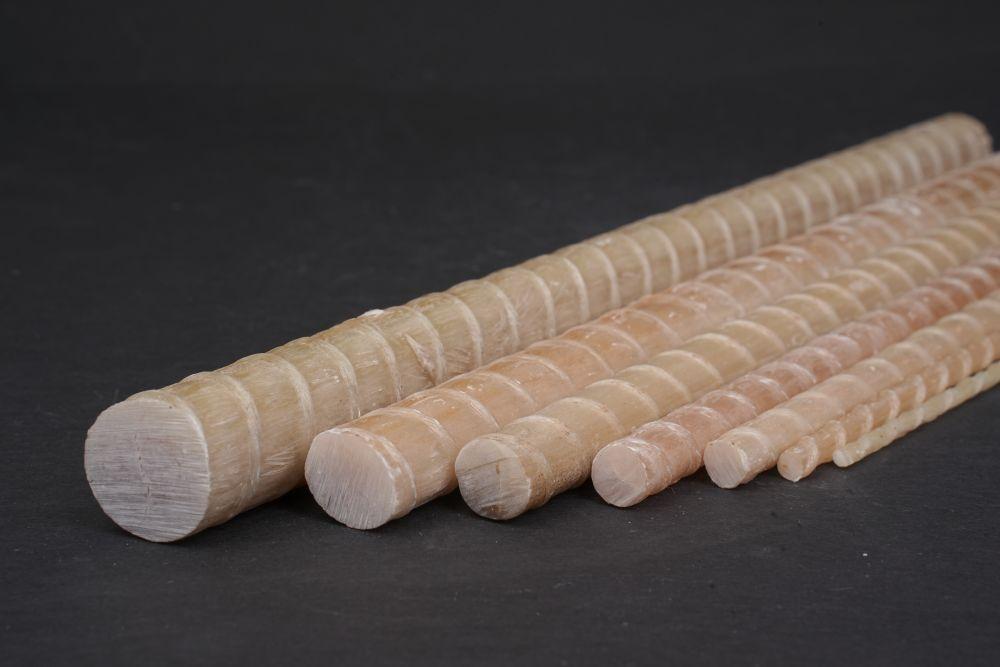- +919659859896
- india@mrg-composites.com
- We Ship Worldwide
- Download Company Profile
ISO 9001:2015 Certified

Durable
Durability is crucial in ensuring the safety and longevity of construction projects. Builders and contractors constantly face challenges that threaten the durability of structures, including material fatigue, environmental stress, and maintenance costs. GFRP Rebar (Glass Fiber Reinforced Polymer Rebar) offers corrosion resistance, cost-effectiveness, non-conductive, and lighter , strength and stronger properties, which makes it more durable.
Challenges to Achieving Durable Structures
In construction, durability determines the ability of a structure to withstand time, weather, and usage. Traditional materials like steel often fall short due to environmental factors. Steel reinforcement bars are prone to corrosion and structural fatigue, which weaken the integrity of buildings and infrastructures. The construction of steel rebars requires regular maintenance and sometimes construction replacements.
Builders face three significant challenges related to durability:
- Structural Integrity: Environmental stresses, such as moisture and chemical exposure, degrade materials, causing cracks and structural failures.
- Increased Maintenance Costs: Regular repairs and replacements due to material degradation inflate maintenance expenses over time.
- Reduced Lifespan of Structures: Poor material durability shortens the lifespan of construction, requiring premature replacements and increasing long-term costs.
Builders need a solution that ensures lasting durability and reduces the need for frequent maintenance.
What Is GFRP Rebar?
GFRP Rebar stands for Glass Fiber Reinforced Polymer Rebar. This advanced composite material consists of high-strength glass fibres bonded with a polymer resin matrix. Unlike steel rebar, GFRP Rebar resists corrosion, making it ideal for durable construction.
GFRP Rebar’s lightweight, high tensile strength, and non-corrosive properties ensure that structures remain stronger and safe over time. It eliminates the risks associated with steel corrosion, enabling long-term durability in challenging environments.

Why Choose GFRP Rebar for Durable Construction?
GFRP Rebar provides unparalleled durability for modern construction needs. Here’s why:
- Superior Durability: GFRP Rebar resists moisture, chemicals, and environmental stressors, ensuring long-term structural integrity. GFRP Rebar is 2 times stronger and ¼ lighter than traditional steel rebar. It makes the construction stronger and can handle heavy traffic.
- Corrosion Resistance: Unlike steel, GFRP Rebar does not rust, even in humid or chemically aggressive conditions. The combination of glass fibres and polymer resin ensures that GFRP Rebar can withstand exposure to water, humidity, and harsh chemicals without rusting.
- Lightweight and Easy Installation: GFRP Rebar is ¼ the weight of steel, simplifying transportation and reducing installation time and labour costs. GFRP Rebar is an ideal choice for construction where weight is a major concern.
- Cost-Effectiveness: GFRP Rebar is a durable construction material That increases the life span of construction. It decreases the maintenance costs and time.
- High Strength-to-Weight Ratio: GFRP Rebar provides twice the tensile strength of steel, ensuring stronger and more reliable construction. GFRP bars are ¼ lighter than traditional steel rebar. It makes the construction lighter and provides more strength, so construction can withstand harsh conditions.
Applications of GFRP Rebars: Enhancing Durability Across Sectors
GFRP Rebar is transforming construction across industries. Its unique properties make it suitable for:
- Marine Structures: It resists saltwater and humidity, ensuring lasting durability in coastal and offshore projects.
- Industrial Plants: GFRP Rebar withstands chemicals and corrosive materials, making it ideal for industrial floors and power plants. GFRP Rebar is a stronger material that can handle heavy traffic in industrial plants and make it more durable for industrial construction.
- Bridges and Highways: Its corrosion resistance enhances the lifespan of infrastructure exposed to de-icing salts and environmental wear. GFRP Rebar is a stronger and lighter material. Bridges and highways go through heavy transportation, and construction should require materials that can handle traffic and harsh conditions.
- Water Treatment Plants: GFRP Rebar endures moisture and chemical exposure, making it a reliable choice for wastewater treatment facilities.
Residential and Commercial Buildings: GFRP Rebar strengthens foundations, parking garages, and rooftop pools, offering a long-lasting solution for urban construction.
Comparison: GFRP Rebar vs Steel Rebar for Durability
Glass Fibre Glass-reinforced polymer comes with various properties such as corrosion resistance, strength, lightweight, non-conductive, etc. The properties of GFRP Rebars make them durable construction materials. Steel is prone to corrosion when exposed to moisture, chemicals, or harsh environments, leading to frequent maintenance, structural degradation, and reduced lifespan. Additionally, its heavy weight increases transportation and installation costs. In contrast, GFRP Rebar is corrosion-resistant, lightweight (75% lighter than steel), and twice as strong, ensuring superior load-bearing capacity and structural integrity. With a longer lifespan, minimal maintenance needs, and cost-effectiveness, GFRP Rebar is the ideal choice for durable, sustainable construction.
Conclusion: GFRP Rebar – The Key to Durable Construction
For builders and contractors seeking long-lasting solutions, GFRP Rebar is the answer. Its corrosion-resistant, lightweight, and durable properties make it the ultimate choice for modern construction projects. Whether it’s marine environments, industrial plants, or residential buildings, GFRP Rebar provides unmatched durability and reliability.

